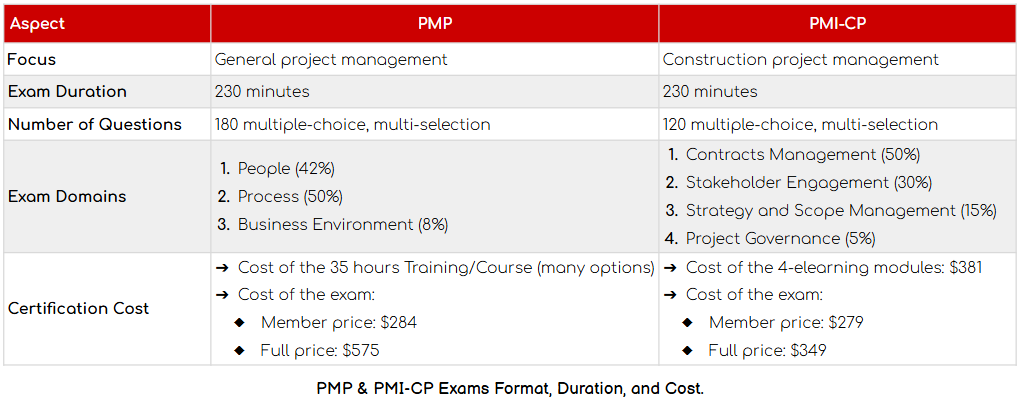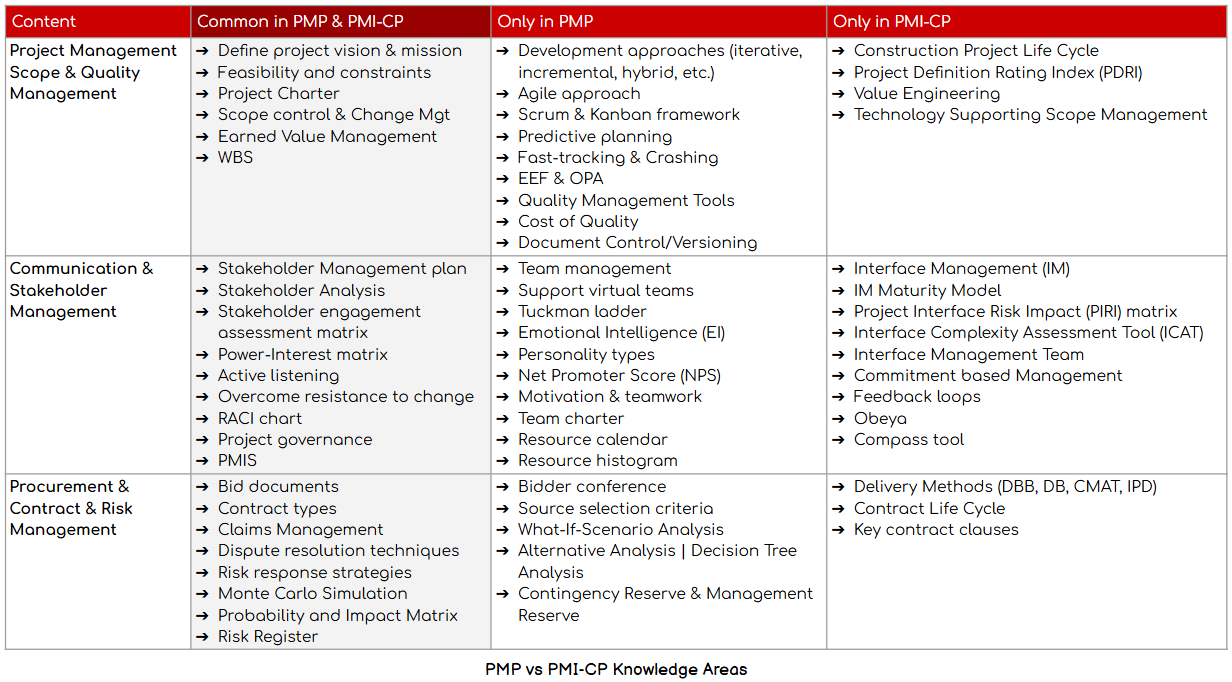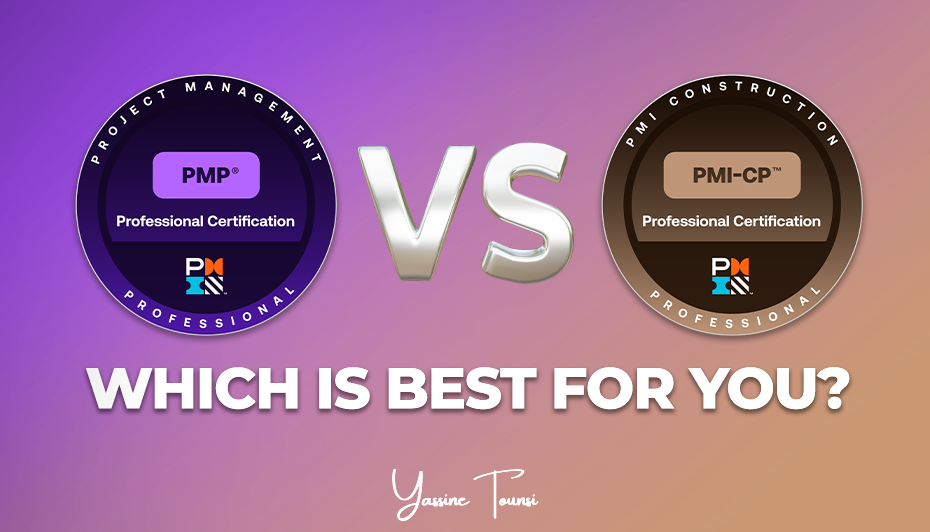If you are exploring career advancement opportunities in project management, certifications like the Project Management Professional (PMP) and the PMI Construction Professional (PMI-CP) are two popular options. While both certifications offer distinct advantages, understanding their nuances will help you decide which aligns better with your career aspirations.
This guide dives deep into the eligibility criteria, application processes, exam details, and career paths for each certification to help you make an informed decision.
About the PMP Certification
The Project Management Professional (PMP) certification, offered by the Project Management Institute (PMI), is a globally recognized credential for professionals in project management. It validates expertise across various industries, making it a versatile choice for those seeking roles in diverse fields.
Key Features of PMP Certification:
- Introduced in 1984, +1,500,000 professionals have been certified since then. Well-known and established.
- Globally applicable across industries: IT, construction, health, education, manufacturing, etc.
- Covers multiple development approaches: iterative, incremental, agile, predictive, and hybrid.
- Comprehensive coverage of project management principles.
About the PMI-CP Certification
The PMI Construction Professional (PMI-CP) certification is designed specifically for professionals in the construction industry. It emphasizes the skills and knowledge required for managing and catering to the unique challenges of construction projects.
Key Features of PMI-CP Certification:
- Introduced in February 2023, +500 professionals were certified two years after its introduction, but demand is increasing rapidly.
- Tailored for the construction sector: capital projects, infrastructure, oil & gas, mining, industrial projects, building, etc.
- Focus on built environment project management practices.
- Practical guidance for roles in construction project oversight and execution.
Eligibility Criteria
The PMI-CP certification has simpler eligibility requirements as no formal education or diploma is required. However, PMP is more flexible when it comes to acquiring the required education to apply for the exam.

Application Process
The application process for both exams is similar. You should first create an account on pmi.org, fill in the application form, and wait for approval. The approval can take up to 5 days.
Applications for PMP and PMI-CP could be audited, and in this case, you need to provide a reference for each project you listed in your application. PMI processes audit materials within 5 to 7 business days of their submission.
For more details, check this step-by-step PMP exam application guide.
Exams Format, Duration, and Cost
You have the choice to sit for the exam on-site or online, for both PMP and PMI-CP. Both exams have the same duration too i.e. 230 minutes. However, the PMI-CP exam includes fewer questions than PMP.
Regarding the cost of the exams, PMI-CP is more expensive than PMP since aspirants are required to take the e-learning modules exclusively provided by PMI or an accredited PMI training provider. On the other hand, PMP can be more flexible with more affordable options to satisfy the 35 contact hours requirement such as online courses.
Here’s a comparison of the different aspects of the two certificates:

Knowledge Areas
There is an overlap between the two certificates when it comes to the covered knowledge areas. Some concepts are part of both PMP and PMI-CP exams content, however, they can be more emphasized in one certification than the other. For example, claims management and project governance are part of the PMP exam content, but they’re addressed more in detail in the PMI-CP certification exam.

Exam Preparation
The typical preparation period for PMP or PMI-CP is two months. It could be longer or shorter depending on two main factors: your availability and learning pace.
PMP Exam Preparation
- Develop a study plan tailored to your schedule.
- Complete a 35 contact hours training or online course to meet eligibility criteria.
- Take PMP mock exams to familiarize yourself with the test format.
For more details on how to prepare for the PMP exam, check this Step-by-step PMP study plan.
PMI-CP Exam Preparation
- Complete PMI’s e-learning courses.
- Review materials specific to construction management such as online courses for better comprehension of the exam knowledge areas.
- Practice with PMI-CP mock tests.
For more details on how to prepare for the PMI-CP exam, check this comprehensive PMI-CP study plan.
PMP vs. PMI-CP: Which to Choose?
The PMP certification has long been recognized for its versatility, serving project managers across a wide range of industries. It covers various methodologies and approaches, providing insights into processes that may be more relevant to certain sectors. The broad scope of PMP is advantageous as it equips project managers with a comprehensive understanding of diverse practices, enhancing their flexibility to work in multiple industries.
The rise of Agile and Lean methodologies marked a significant shift in project management in my opinion. Agile became dominant in IT, and Lean principles gained traction across various sectors. In response, the PMP evolved to incorporate these approaches. However, this evolution posed challenges for construction professionals, whose projects predominantly follow predictive methodologies. Learning Agile-centric tools and techniques, while valuable in some areas, often felt misaligned with the needs of the construction industry. This gap highlighted the necessity of a specialized certification.
With the introduction of the PMI-CP certification, PMI addressed this need. For professionals in the construction sector or those aspiring to join it, the PMI-CP is an obvious choice; It focuses on challenges constantly encountered by construction professionals, such as contract negotiation and scope management. Conversely, if your career goals span industries like IT, healthcare, or finance, PMP remains the ideal choice, as it covers a wide array of project management techniques and methodologies suited for diverse environments.
I am PMP-Certified, should I pursue PMI-CP too?
We have already established that, if you work in the construction field, PMI-CP would be a better choice than PMP. However, if you’re a PMP-certified professional, pursuing PMI-CP too will maximize your career opportunities, but you should consider your geographic location since some countries value and have a higher request for one certificate over another. For instance, the US and Canada have the highest number of PMI-CP certified professionals and they’re starting to list the certification in their job preferences. You can check the number of PMI-CP holders by country HERE.
Beyond market demand, earning the PMP certification can significantly simplify PMI-CP preparation due to the shared knowledge areas between the two certifications. By building on your broad project management expertise with construction-specific knowledge, you enhance your skill set and career prospects. If you have the financial resources and are eager to deepen your understanding of managing construction projects, pursuing the PMI-CP certification is a smart and rewarding choice.
Conclusion
Both the PMP and PMI-CP certifications offer unique advantages. Your choice depends on your career goals, industry focus, and the type of projects you aspire to manage. Regardless of your decision, both certifications can significantly enhance your skills, credibility, and career prospects.
